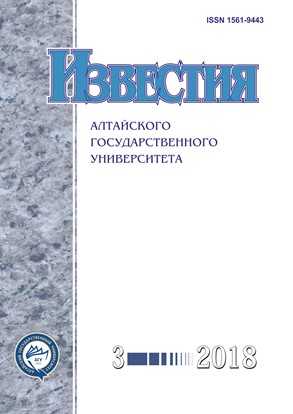Tax Incentives as Way to Provide Social Support for Families with Children
Abstract
The tax legislation establishing tax benefits for families with children is represented both by the Tax Code of the Russian Federation, tax laws of subjects of the Russian Federation, and regulatory legal acts on the taxes of representative bodies of municipalities. This article for the first time attempts to analyze the tax legislation of the regional and local level of seven subjects of the Russian Federation in the Siberian Federal district, establishing tax incentives for families with children: Altai and Krasnoyarsk territories, Novosibirsk, Tomsk, Omsk and Kemerovo regions, as well as the Altai Republic.
The publication established that if the tax policy in relation to the establishment of tax benefits for families with children in the Altai region is one of the best in the Siberian Federal district, municipal formations in the Altai region do not have the financial ability to provide adequate financial support to families with children on the same level as in the municipalities in other regions of the Russian Federation in the Siberian Federal district.
The main problem with the use of tax incentives for families with children is that most taxpayers are unaware of the benefits they have under the law. In our opinion, this problem can be solved through additional explanatory work through social services.
DOI 10.14258/izvasu(2018)3-09
Downloads
Metrics
References
Конституция Российской Федерации (принята всенародным голосованием 12.12.1993) (с учетом поправок, внесенных Законами РФ о поправках к Конституции РФ от 30.12.2008 № 6-ФКЗ, от 30.12.2008 № 7-ФКЗ, от 05.02.2014 № 2-ФКЗ, от 21.07.2014 № 11-ФКЗ) // Собрание законодательства РФ. — 2014. — № 31. — Ст. 4398.
Калашников С.В. Очерки теории социального государства. — М., 2006.
Послание Президента РФ В.В. Путина Федеральному Собранию РФ от 1 марта 2018 г. [Электронный ресурс]. — URL: http://home.garant.ru.
Налоговый кодекс Российской Федерации (часть вторая) от 05.08.2000 № 117-ФЗ (ред. от 07.03.2018) (с изм. и доп., вступ. в силу с 01.04.2018) // Собрание законодательства РФ. — 2000. — № 32. — Ст. 3340.
Региональное финансовое право : моногр. / отв. ред. И.Б. Лагутин. — М., 2017.
Зарипов В.М. Правовые инструменты повышения эффективности налоговых льгот // Закон. — 2014. — № 2.
Герасимов В.Н. Проблемы современных многодетных семей в России: сравнительный анализ с законодательством стран ЕС // Российская юстиция. — 2011. — № 2.
Письмо Федеральной налоговой службы от 16.02.2018 № ММВ-17-11/46 «О налоговых льготах и вычетах» [Электронный ресурс]. — URL: http://home.garant.ru.
Закон Алтайского края от 10.10.2002 № 66-ЗС «О транспортном налоге на территории Алтайского края» (с изм. от 30.11.2017) // Алтайская правда. — 2002. — 25 октября. — № 284-286.
Указ Президента Российской Федерации от 16.01.2017 № 13 «Об утверждении Основ государственной политики регионального развития Российской Федерации на период до 2025 года» // Собрание законодательства РФ. — 2017. — № 4. — Ст. 637.
Copyright (c) 2018 И.И. Игнатовская

This work is licensed under a Creative Commons Attribution 4.0 International License.
Izvestiya of Altai State University is a golden publisher, as we allow self-archiving, but most importantly we are fully transparent about your rights.
Authors may present and discuss their findings ahead of publication: at biological or scientific conferences, on preprint servers, in public databases, and in blogs, wikis, tweets, and other informal communication channels.
Izvestiya of Altai State University allows authors to deposit manuscripts (currently under review or those for intended submission to Izvestiya of Altai State University) in non-commercial, pre-print servers such as ArXiv.
Authors who publish with this journal agree to the following terms:
- Authors retain copyright and grant the journal right of first publication with the work simultaneously licensed under a Creative Commons Attribution License (CC BY 4.0) that allows others to share the work with an acknowledgement of the work's authorship and initial publication in this journal.
- Authors are able to enter into separate, additional contractual arrangements for the non-exclusive distribution of the journal's published version of the work (e.g., post it to an institutional repository or publish it in a book), with an acknowledgement of its initial publication in this journal.
- Authors are permitted and encouraged to post their work online (e.g., in institutional repositories or on their website) prior to and during the submission process, as it can lead to productive exchanges, as well as earlier and greater citation of published work (See The Effect of Open Access).








